Coronavirus: Donald Trump faces another virus scare as Qantas announces new flights
Donald Trump has had another close shave with the coronavirus, while Qantas has announced a number of new flights for Australians overseas who want to return home.

Coronavirus
Don't miss out on the headlines from Coronavirus. Followed categories will be added to My News.
Donald Trump’s valet tests positive to coronavirus
Johnson extends UK lockdown
US says Wuhan lab evidence ‘could be wrong’
‘Keg convoy’ headed for NT
Australians hoping to fly home during the coronavirus pandemic have been given new options with Qantas announcing limited flights to Melbourne from Los Angeles and London.
It also opens the potential for pets to be flown back to Australia.
Previous special Qantas and Virgin Australia flights organised during the pandemic flew from LA to Brisbane.
Brisbane does not have the facilities to quarantine pets, forcing Australians planning to fly home during the pandemic to leave their pets in the US or opt not to return to Australia.

Under Australia’s strict border rules cats and dogs must arrive directly into Melbourne Airport and be quarantined at a facility at Mickleham, near Melbourne.
The Australian government has requested owners of pets planning to fly back to Australia on one of the new Melbourne flights to contact Qantas and their chosen pet carriers to check on animal transportation.
AAP has sought comment from Qantas.
Airlines have severely cut back flights during the pandemic. Qantas’ new limited Los Angeles to Melbourne flights are scheduled for May 16, 23 and 30 and June 6.
United Airlines is flying daily from San Francisco to Sydney. The new Qantas London-Melbourne flights are on May 13, 15, 20, 22, 27, 29 and June 3 and 5.
DONALD TRUMP’S VIRUS SCARE
A member of the military serving as one of US President Donald Trump’s valets has tested positive for the coronavirus, the White House confirmed.
It said Mr Trump and Vice President Mike Pence have since tested negative for the virus and “remain in good health.”
It marked the latest coronavirus scare for the US President where a person who has come within close proximity to Mr Trump has tested positive since several people present at his private Florida club were diagnosed with COVID-19 in early March. The person tested positive on Wednesday, the White House said.
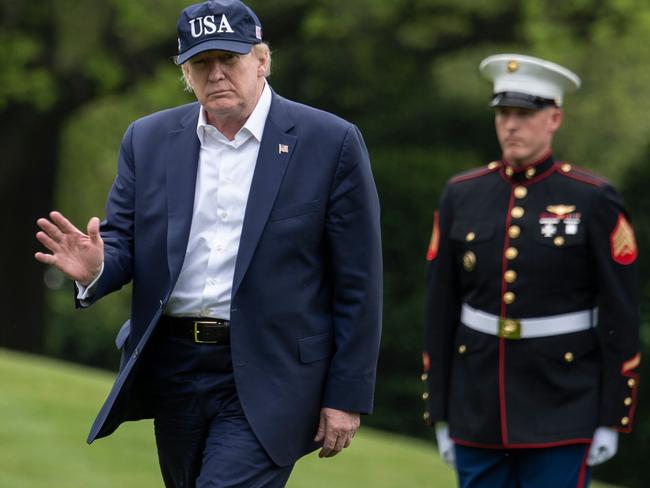
“We were recently notified by the White House Medical Unit that a member of the United States Military, who works on the White House campus, has tested positive for coronavirus,” White House spokesman Hogan Gidley said in a statement.
“The President and the Vice President have since tested negative for the virus and they remain in great health.”
A person familiar with the matter said the member of the military who tested positive was one of the president’s valets. The person spoke on condition of anonymity because they were not authorised to discuss the matter publicly. The White House instituted safety protocols nearly two months ago, including frequent temperature checks. Last month it began administering rapid COVID-19 tests to all those in proximity to the president, with staffers being tested about once a week.
Several valets cater to Mr Trump and his guests at the White House, both in the West Wing and in the White House residence.
It comes as US Secretary of State Mike Pomepo has said that intelligence suggesting COVID-19 came from a Wuhan lab “could be wrong.”
Speaking during a round of interviews, Mr Pompeo also suggested that circumstantial evidence claiming that COVID-19 may have come from a lab in Wuhan is the same as direct proof.
Mr Pompeo said on Sunday that there is “enormous evidence” that the virus escaped from the Wuhan Institute of Virology. However, on Wednesday, Pompeo said the US did not have any “certainty” to back the theory but said the Chinese could easily provide the answer.
On Thursday, he told US radio: “There’s evidence that it came from somewhere in the vicinity of the lab, but that could be wrong.”
UK LOCKDOWN EXTENDED
Meanwhile, Britain’s lockdown has been extended by three weeks – after Boris Johnson urged “maximum caution”.
Dominic Raab confirmed the news on Thursday night (local time) that there is “no change” yet as the virus is still “deadly and infectious”, but some minor tweaks are expected in the coming days.
The British PM will address the UK at the weekend and is expected to relax some small measures – like being able to have a picnic and taking longer exercise – but the lockdown will carry on in most forms.
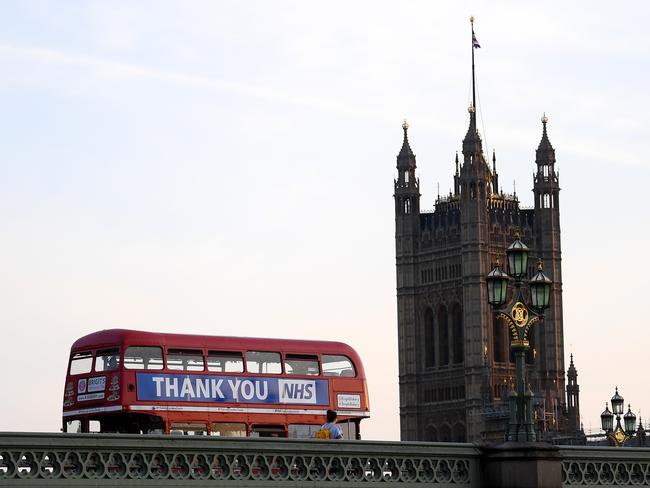
Mr Raab told the public: “I’ve said it very clearly – there is no change in the rules today.
“What the PM will do is set out a road map with milestones, that can look to the future.
“The virus is not beaten yet – it remains deadly and infectious.
“We are working hard to bring it down in areas of concern.
“I am confident we can and we will do it.”
He refused to “jump the gun” and reveal what changes could come in the next few days.
But he revealed that the R rate of transmission is now somewhere between 0.5 and 0.9. Crucially it’s still below one so the virus is not transmitting it on to large numbers of people.
Mr Johnson’s road map will contain “milestones” which must be reached before any changes – and “detailed guidance” for the public and businesses into the new tweaks.

NT ‘KEG CONVOY’ AS PUBS GET SET TO RE-OPEN
Meanwhile, Darwin is aiming to import 175,000 litres of beer in time for the opening of pubs and clubs next Friday as the Northern Territory lifts coronavirus restrictions.
Chief Minister Michael Gunner told The Australian“the beers are here, and the jobs are back”.
But some social-distancing measures will remain in place. There will be a two-hour limit on patrons visiting venues and alcohol must be served with food. These restrictions are scheduled to expire in early June.
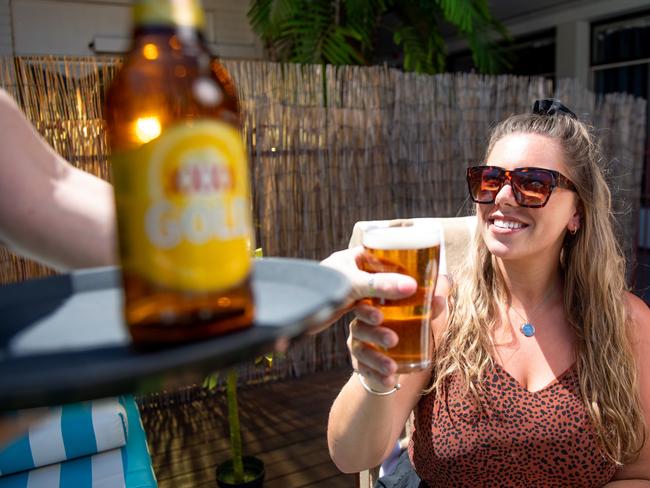
Darwin publican Steve Kotz told The Australian it will help with community morale.
“You don’t realise until something like this happens how important it is to people to be able to go out and have a beer,” he said.
AUSSIES TO SEE THREE-STAGE PLAN TO REOPEN THE ECONOMY
Easing coronavirus restrictions on some retail, small gatherings and community sport will lead the first phase of relaxed measures, but Australians will need to wait a month for health experts to green light further changes.
The National Cabinet is expected to agree to a three stage plan to reopen the economy on Friday, with epidemiologists requiring about four weeks between each major move to assess its impact on the COVID-19 curve.
It will be up to individual states and territories to decide exactly when each closure is rolled back within the broad framework supported by every government.
Leaders have agreed to an overall goal of reaching a “COVID safe” economy by July; however many restrictions – including large crowded events and international travel – will remain for much longer.
Businesses will be encouraged to develop innovative strategies to maintain social distancing within their individual workplace in an effort to maximise how much of the economy can be opened up without increasing the health risk.
Reopening schools is seen as the key to kickstarting the economy by the Morrison Government after Treasury estimates recently revealed about 304,000 people withdrew from the labour force due to student absences.
Wage support through the JobKeeper subsidy and coronavirus supplement doubling the JobSeeker dole payment will continue until September as it is expected Australians will need several months before consumer confidence and demand grows.
The Morrison Government is hoping to build economic momentum over time as more activities and venues reopen and the public is reassured the virus is still contained.
Experts were unable to determine which restrictions Australia implemented going into the shutdown were most effective, as most occurred within a matter of weeks.
Certain restrictions implemented later into the pandemic, such as placing overseas travels in hotels for a two-week quarantine period, had an obvious positive impact on slowing the rate of community transmission.
However other restrictions such as closing cafes and pubs, restricting gathering sizes outdoors and in the home, and closing state borders, all happened so quickly it is impossible to know which measure was more or less effective at stopping the spread of COVID-19.
It is hoped rolling back some restrictions will ease the economic impact of the coronavirus crisis, with New Single Touch Payroll data shows the number of jobs in Australia decreased by about 7.5 per cent, and the wage bill paid by business decreased by 8.2 per cent between the weeks ending 14 March and 18 April.
The largest falls in jobs were in Accommodation and Food Services, and Arts and Recreation.
Australian banks have so far deferred an estimated $160 billion in mortgages and small and medium enterprise loans for six months.
About 1.2 million people have been approved to access early superannuation worth a total of $9.8 billion, 767,808 businesses covering 5 million employees have enrolled in JobKeeper.
The latest mobility data revealed that while car volumes on roads have fallen consistent with restrictions, truck volumes have remained steady meaning logistics have remained open.
NEW WARNING BEFORE LOCKDOWNS EASE AS 40M NEW MASKS RELEASED
Federal Health Minister Greg Hunt says the world will watch on in envy as Australians “regain their lives” after successfully suppressing the spread of coronavirus.
Mr Hunt said Australians were doing a “magnificent job” complying with social distancing restrictions.
“In terms of isolation, tomorrow the National Cabinet will consider the first stages on the road out and that’s only possible because of the extraordinary work of Australians,” he said.
“Again, I say thank you. You have helped put us in this position, where Australians will now be at the forefront of beginning to regain their lives as the world looks on.”
Mr Hunt said it would be “extremely important” to keep basic measures, including 1.5m distancing, good hand hygiene, and cough “etiquette” going as restrictions eased.
“These are not polite things to do, these are lifesaving, necessary measures,” he said.
Australia’s COVID-19 tally rose to 6,891 on Thursday, with Victoria responsible for 14 of the 18 new cases in the last 24 hours confirmed nationally.
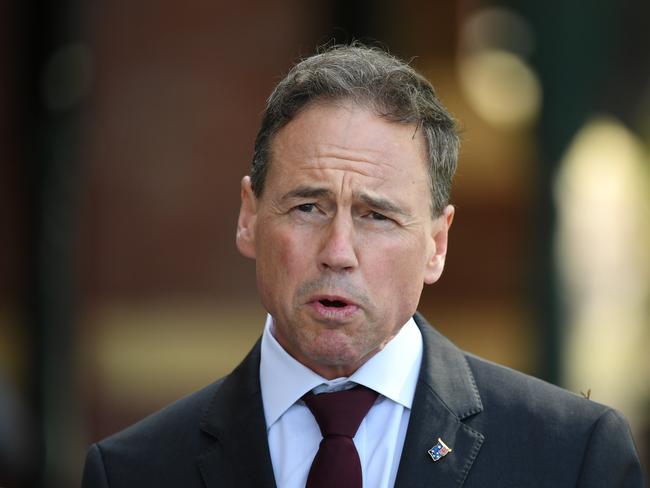
“From the outset, we said there would be spikes or outbreaks in particular areas and in particular places and I want to thank and acknowledge the difficult work that Victoria and their public health units are doing in dealing with the particular outbreak that they’re facing,” he said.
“They are doing everything they can.
“So we need to be prepared for this. We warned about it previously, but I’ll continue to say, as we go forwards, there will be cases of outbreaks or spikes, and that’s why our testing, our tracing and our public health responses and our immediate rapid response capability are so critical and are being put in place.”
Mr Hunt said 6,023 Australians had now cleared the virus and recovered.
“That’s an immensely important statistic,” he said.
“Sadly, we have lost 97 beautiful lives along the way, many of them elderly.
“We are down to 24 people in ICU, and 17 people on ventilators.
“But we’ll continue to push to save and protect every life.”
Mr Hunt said 40 million masks from the national medical stockpile would now be made available on top of 34 million masks released to date.
“That will include 35 million masks between now and the end of May for our hospitals,” he said.
“It will include 1.5 million additional masks for our aged care workers, and 3.5 million masks for our primary health care workers, including 2 million for
general practices with a specific focus, obviously, on the doctors and the nurses.”
There will also be 220,000 masks for respiratory clinics, 660,000 for pharmacy, 500,000 for allied health workers and 120,000 for indigenous health workers.
AUSSIES TAKE $102 BILLION COVID-19 HIT
Australian households will miss out on $102 billion of income through lost jobs and lower hours because of the coronavirus crisis.
A new study from the Australian National University finds there have been unprecedented falls in employment and hours worked between February and April, when the restrictions to deal with the crisis bit hard.
The survey found the proportion of people with jobs dropped from 62 per cent to 58.9 per cent – five times bigger than any other two-month fall in employment.
The biggest drops were among the nation’s youngest workers, closely followed by those who’d just tipped into retirement age.
Casual workers were far more likely to have lost their jobs. Average hours worked fell by more than 13 per cent, from 35.1 to 31.1 hours a week.

One in four people said they had their hours cut and one in eight said they’d been made to take paid leave.
“This is unprecedented in modern Australian economic history,” researcher Matthew Gray said.
“If previous periods of high unemployment are any guide, the effect on the young is likely to be felt throughout their working life, and those who leave the labour force when close to retirement age may never return.”
People who had jobs were much less confident about keeping them or being able to find another good position if they needed to.
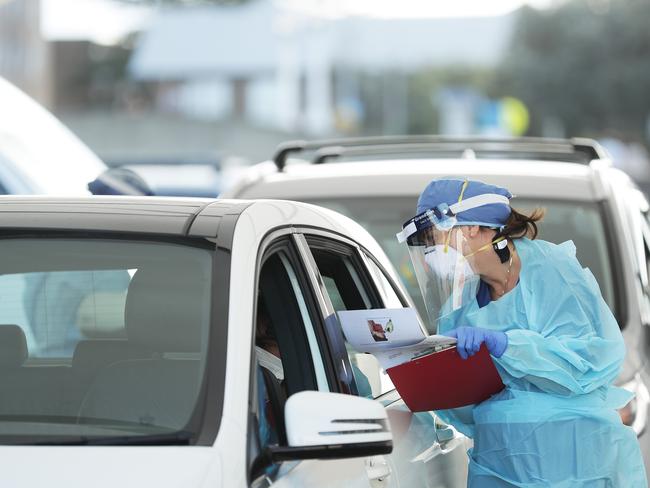
All this had a big impact on how much money people had, with average household incomes dropping by about 10 per cent from February levels.
Professor Gray said the total hit to annual income would be $102 billion. But he says one of the most important findings was that government support had actually led to the poorest households finding their weekly income grew by a third.
The ANU poll surveyed 3155 people in the second half of April. The same respondents were also surveyed in January and February.
The government has temporarily doubled the rate of unemployment benefits and sent a $750 payment to most pensioners.
Labor wants the audit office to look at how the government’s massive support spend has affected Commonwealth debt.
The Morrison government has raised the notional debt ceiling from $600 billion to $850 billion.
Labor is concerned about future generations dealing with the debt, as a new Swinburne University of Technology report shows home ownership is projected to decline from 67 per cent in 2016 to 63 per cent by 2040.
It also finds that by 2040 about half of households in the 25 to 55 age group will own a home, down from 60 per cent in 1981.
WARNING ON EASING VIRUS RESTRICTIONS
Australia’s leaders have been urged not to release the handbrake on coronavirus restrictions too quickly, to avoid a potentially disastrous second infection wave.
State and federal leaders will decide what rules are to be eased on Friday at a crucial national cabinet meeting.
Deputy chief medical officer Paul Kelly said restrictions would be gradually eased rather than a wholesale return to life before the pandemic.
“Some things will open – others will not,” he told reporters in Canberra.
“It will be scaled so that risk of increasing the number of cases is minimised while giving the maximum benefit to the economy and to normalisation of society.”
The ACT will stagger sending public school students back to classrooms over the next four weeks.
Select year levels will begin returning from May 18 before all students are back by June.
Canberra’s non-government schools are expected to set a similar timeline.
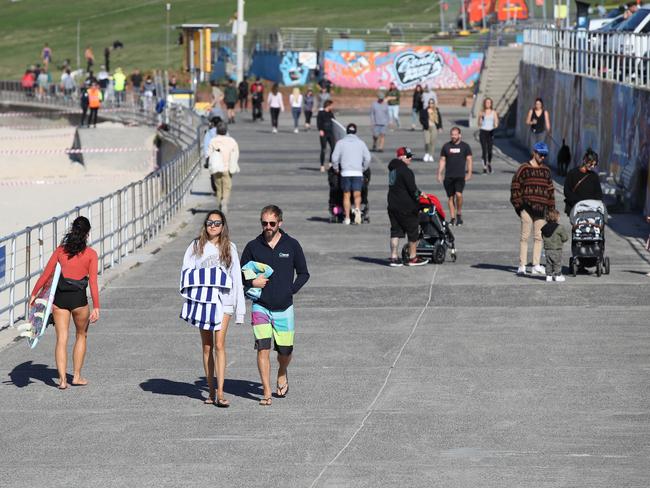
Adults on campus will still be expected to follow social distancing measures, with the schools to undergo deep cleaning before students return.
Australian Medical Association president Tony Bartone is warning national cabinet not to feel pressured into lifting restrictions.
“Friday’s meeting should continue to apply medical evidence when putting the health of all Australians first,” he said.
He said reinstating isolation measures after a second wave of infections would be worse for health outcomes and the economy than a cautious relaxation.
“People should not get their hopes up too high at this stage, because rushing to get things back to normal, without caution and safeguards, risks a huge setback for everyone,” Dr Bartone said.
There have been 6875 cases of coronavirus in Australia, with 5984 people recovered. Ninety-seven people have died.
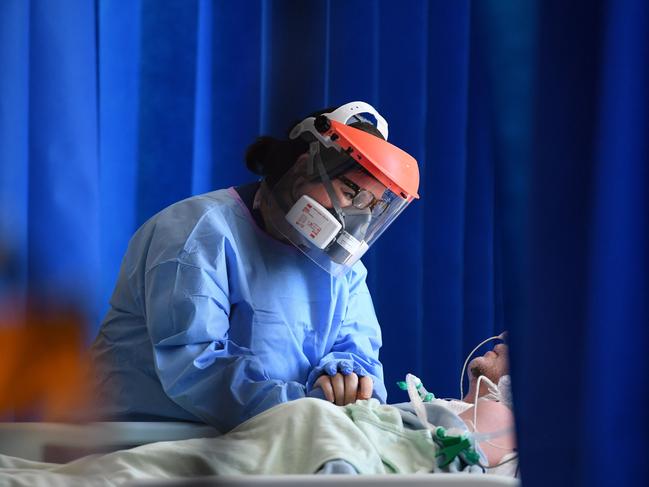
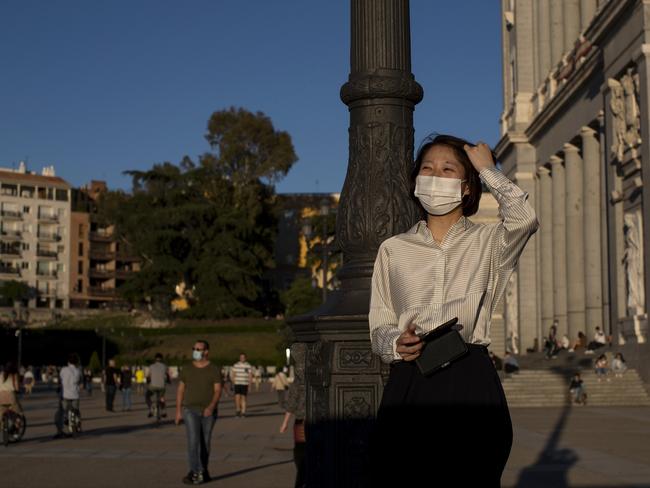
It comes as the World Health Organisation warned that countries emerging from restrictions to halt the coronavirus must proceed “extremely carefully” or risk a rapid rise in new cases.
Director-General Tedros Adhanom Ghebreyesus said countries needed to ensure they had adequate measures to control the spread of the COVID-19 respiratory disease like tracking systems and quarantine provision.
“The risk of returning to lockdown remains very real if countries do not manage the transition extremely carefully and in a phased approach,” he said at a virtual briefing in Geneva.
WHO epidemiologist Maria Van Kerkhove supported his concerns about the disease which has infected 3.71 million globally and killed more than 258,000 people, according to a Reuters tally.
“If lockdown measures are lifted too quickly, the virus can take off,” Van Kerkhove told the briefing.
Government-ordered lockdowns have become increasingly unpopular as countries suffer rising unemployment and economic activity grinds to a halt.
The eurozone economy will contract by a record 7.7 per cent this year because of the pandemic, while US private employers laid off 20.2 million workers last month as business shut their doors.
Some countries, like Germany, Spain and Italy have started to relax restrictions, while US President Trump has said his focus is on opening up the country again.
Originally published as Coronavirus: Donald Trump faces another virus scare as Qantas announces new flights
